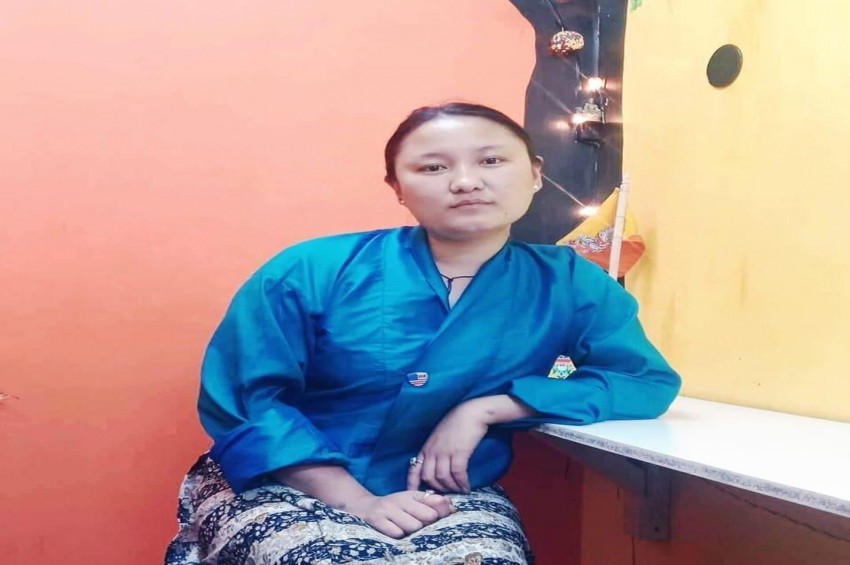The Australian Magnet
Hundreds of Bhutanese continue to leave for Australia
Hundreds of people who had queued at the Institute of Management Studies (IMS), Serbithang, on March 31, 2022, to register for the IELTS examinations was again evidence of how many Bhutanese are striving to go abroad for studies and work. This is yet another evidence of hundreds of Bhutanese, especially youth seeking better opportunities outside, which in simple terms mean more money. This is further fuelled by the Bhutanese labour marker, still grasping with the problem of matching supply and demand, leading to very high youth unemployment rate, when there are still hundreds looking for work.
Tshering, a graduate and one of the many who had queued at IMS said it is impossible to even think about leading a life in Thimphu. “Even if I get a job, I will not be paid more than Nu 20,000 a month. What can I do with this money, with very high house rents, social obligations and other expenses,” he said, adding he has to support his parents, too. Tshering mentioned that a job, whatever it may be, will not just secure his present, but also the future. “I can ensure that my children get good education and save for retirement,” he said.
Another who had registered for the IELTS, and did not want to be named, said she would be going for her studies to Australia. When asked why she doesn’t want to continue studying in Bhutan, she said, Australia provides the opportunity to work and study. “I would not be a burden to my parents, who will need to spend a lot for college,” she added. “Moreover, after college, I will get the opportunity to even do my masters and doctorate, though I have not yet planned for it,” she said. When asked if she would return home, she said it would depend on circumstances. “People say money does not matter, but it does and if I cannot lead a decent life in Bhutan, even if I get a government job, what is the use,” she said.
A civil servant seeking anonymity said monetary incentive is the major factor making people leave Bhutan. “The cabinet secretary is the highest paid civil servant. And it will take years for one to reach the post. What graduates and mid level civil servants get today as salary is very less; due to which some even take loans to buy essentials required to settle down,” he said. “Additionally, cars have become a necessity, bought again through loans from financial institutions, that charge one of the highest interest rates in the entire world,” he continued, adding there may not be any civil servant or private employees without loans. “So, one can imagine living in places like Thimphu,” he said.
Lobzang Phuntsho, a private employee believes it is economic security making people leave for Australia. “If you have one member from your family, studying and working in Australia, it is a big relief for the entire family as there is security that should something happen, there is someone to help,” he said. According to Lobzang, he is the perfect example. “My brother is in Australia and whenever there are emergencies associated with money, we can bank on him,” he said, adding that he is also planning to leave the country for Australia.
Just like Lobzang, there are many Bhutanese whose relatives and close friends left for Australia many years back, with most having acquired the permanent residence (PR) status by now. The presence of relatives and friends makes it easier for Bhutanese to get work. They are also encouraged by friends and family to come Down Under to work and study.
The gross monthly salary at the entry level (P5/SS4) for civil servants who get through the Royal Civil Service Examinations is Nu 26,850, equivalent to about Australian dollar 473 at the current rate of Nu 56.70 for a dollar. This can be earned if one works for just 20 hours in Australia. “You can see the difference and money that can be made if spouses or family members work together,” Sonam Dorji, a private employee said, adding it is these savings through which Bhutanese in Australia have bought property, like land, buildings and flats in Thimphu and other urban areas.
In an earlier story covered by The Journalist, Bhutanese in Australia had said they have not forsaken the country and that they are working hard and using their earnings to help ameliorate the living standards of their family back home, thereby contributing to the improvement in the overall national living standards. They also said that they contribute to the hard currency reserves of Bhutan, while indirectly helping relieve unemployment pressures. Apart from these, a Bhutanese from Australia said they are learning important life skills such as time management, work-life balance and other skills which they take back home when they return.
Though remunerations received are substantial, a Bhutanese from Australia who sought anonymity said, “Things would change.” “Now, people bring their entire family members to Australia, due to which there is no need to send any money back home. Moreover, Bhutanese have begun investing in Australia, which would impact remunerations,” he said. When asked what Bhutan should do to control those, especially ones in the very productive age groups from leaving the country, he said, education is the key.
“His Majesty’s focus on technology is great. This will enable Bhutanese in this area to work across borders as work in this field does not demand that one be in a particular place or country. Additionally, the education system must be revamped and curricula matched with the needs of not just Bhutan, but the world,” he said, adding that foreign direct investment (FDI) is another window of opportunity. “Bhutan has comparative advantages. Most speak fluent English. Politically, we are very stable. The ease of doing business should be enhanced to attract investors,” he said.
A resident from Sarpang spoke about a girl who had taken up commercial farming after graduation. “After about 5 years, she has decided to go to Australia and when I asked what the reasons are she said that there is no support from the government. It is just on paper and when you go seeking support, there are layers and layers of bureaucratic red-tapes,” he said, emphasizing that service delivery and ease of doing business should be a priority.
Hundreds of Bhutanese continue to leave for Australia
Hundreds of people who had queued at the Institute of Management Studies (IMS), Serbithang, on March 31, 2022, to register for the IELTS examinations was again evidence of how many Bhutanese are striving to go abroad for studies and work. This is yet another evidence of hundreds of Bhutanese, especially youth seeking better opportunities outside, which in simple terms mean more money. This is further fuelled by the Bhutanese labour marker, still grasping with the problem of matching supply and demand, leading to very high youth unemployment rate, when there are still hundreds looking for work.
Tshering, a graduate and one of the many who had queued at IMS said it is impossible to even think about leading a life in Thimphu. “Even if I get a job, I will not be paid more than Nu 20,000 a month. What can I do with this money, with very high house rents, social obligations and other expenses,” he said, adding he has to support his parents, too. Tshering mentioned that a job, whatever it may be, will not just secure his present, but also the future. “I can ensure that my children get good education and save for retirement,” he said.
Another who had registered for the IELTS, and did not want to be named, said she would be going for her studies to Australia. When asked why she doesn’t want to continue studying in Bhutan, she said, Australia provides the opportunity to work and study. “I would not be a burden to my parents, who will need to spend a lot for college,” she added. “Moreover, after college, I will get the opportunity to even do my masters and doctorate, though I have not yet planned for it,” she said. When asked if she would return home, she said it would depend on circumstances. “People say money does not matter, but it does and if I cannot lead a decent life in Bhutan, even if I get a government job, what is the use,” she said.
A civil servant seeking anonymity said monetary incentive is the major factor making people leave Bhutan. “The cabinet secretary is the highest paid civil servant. And it will take years for one to reach the post. What graduates and mid level civil servants get today as salary is very less; due to which some even take loans to buy essentials required to settle down,” he said. “Additionally, cars have become a necessity, bought again through loans from financial institutions, that charge one of the highest interest rates in the entire world,” he continued, adding there may not be any civil servant or private employees without loans. “So, one can imagine living in places like Thimphu,” he said.
Lobzang Phuntsho, a private employee believes it is economic security making people leave for Australia. “If you have one member from your family, studying and working in Australia, it is a big relief for the entire family as there is security that should something happen, there is someone to help,” he said. According to Lobzang, he is the perfect example. “My brother is in Australia and whenever there are emergencies associated with money, we can bank on him,” he said, adding that he is also planning to leave the country for Australia.
Just like Lobzang, there are many Bhutanese whose relatives and close friends left for Australia many years back, with most having acquired the permanent residence (PR) status by now. The presence of relatives and friends makes it easier for Bhutanese to get work. They are also encouraged by friends and family to come Down Under to work and study.
The gross monthly salary at the entry level (P5/SS4) for civil servants who get through the Royal Civil Service Examinations is Nu 26,850, equivalent to about Australian dollar 473 at the current rate of Nu 56.70 for a dollar. This can be earned if one works for just 20 hours in Australia. “You can see the difference and money that can be made if spouses or family members work together,” Sonam Dorji, a private employee said, adding it is these savings through which Bhutanese in Australia have bought property, like land, buildings and flats in Thimphu and other urban areas.
In an earlier story covered by The Journalist, Bhutanese in Australia had said they have not forsaken the country and that they are working hard and using their earnings to help ameliorate the living standards of their family back home, thereby contributing to the improvement in the overall national living standards. They also said that they contribute to the hard currency reserves of Bhutan, while indirectly helping relieve unemployment pressures. Apart from these, a Bhutanese from Australia said they are learning important life skills such as time management, work-life balance and other skills which they take back home when they return.
Though remunerations received are substantial, a Bhutanese from Australia who sought anonymity said, “Things would change.” “Now, people bring their entire family members to Australia, due to which there is no need to send any money back home. Moreover, Bhutanese have begun investing in Australia, which would impact remunerations,” he said. When asked what Bhutan should do to control those, especially ones in the very productive age groups from leaving the country, he said, education is the key.
“His Majesty’s focus on technology is great. This will enable Bhutanese in this area to work across borders as work in this field does not demand that one be in a particular place or country. Additionally, the education system must be revamped and curricula matched with the needs of not just Bhutan, but the world,” he said, adding that foreign direct investment (FDI) is another window of opportunity. “Bhutan has comparative advantages. Most speak fluent English. Politically, we are very stable. The ease of doing business should be enhanced to attract investors,” he said.
A resident from Sarpang spoke about a girl who had taken up commercial farming after graduation. “After about 5 years, she has decided to go to Australia and when I asked what the reasons are she said that there is no support from the government. It is just on paper and when you go seeking support, there are layers and layers of bureaucratic red-tapes,” he said, emphasizing that service delivery and ease of doing business should be a priority.















